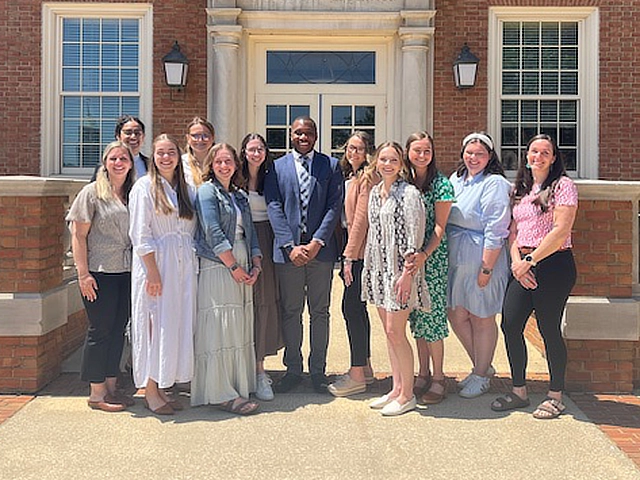
For the past year, 10 senior teacher education students have actively participated in a new partnership, which culminated in the presentation of their project, “Difficult Conversations,” at the conclusion of the spring semester.
For years, Penn State University’s holocaust, genocide and human rights education initiative has sought to provide K-12 educators with professional learning on effective instruction for difficult topics. This effort is a part of the Hammel Family Human Rights Center at Penn State, which, for the first time, provided their expertise to preservice teachers within Orlean Beeson School of Education’s department of Teacher Education.
“Faculty from Samford connected with staff from PSU’s holocaust, genocide, and human rights education initiative to support candidates as they navigate difficult topics that they will face as practitioners,” said Amy Hoaglund, assistant dean and professor.
“The Center primarily works with in-service teachers, and they were excited to work for the first time with preservice teachers who were just beginning their careers.”
According to the grant which supported the partnership, the goal is to empower Teacher Education candidates to address racism and trauma. Using the Inquiry-Based Approach, the program cultivates empathetic, critically analytical educators.
“Samford faculty partnered with PSU staff to support candidates during the process through a combination of in person and virtual learning experiences where they were placed in inquiry communities. The candidates were guided in examining their own experiences through a trauma informed lens so they could better understand their students and approach difficult topics with empathy,” said Hoaglund.
Through a trauma-informed lens, the partnership sought to guide Samford students in developing insight into the human condition and life skills such as empathy, active listening, critical thinking, civic discourse and agency by applying inquiry approaches to the instruction of difficult topics. Over time, these methods have proven to contribute to the implementation of equitable education in schools across the country.
“Equitable pedagogy surrounding difficult topics offers all students the safe environment needed to effectively learn these lessons and be nurtured into healthy adulthood,” said Anna McEwan, dean of Orlean Beeson School of Education. “It creates classroom cultures that in-turn create healthy communities.”
Many from across Samford’s campus and the community attended the event where Teacher Education students “Difficult Conversations” was initially presented, however, another opportunity to see the impact of this work is coming.
Building upon the collaboration between Samford University and Penn State, this year’s Diversity Forum, hosted by Orlean Beeson School of Education and in partnership with the Office of Student Success and Diversity, will offer sessions that foster inclusive learning, nurture socially aware teachers dedicated to Kingdom change, and promote understanding, empathy and meaningful social and individual growth.
“The Diversity Forum has become a keystone event in executing Samford University’s Christ-centered mission,” said McEwan. “This work is foundational to ensuring that all people can experience loving kindness in the classroom and in community.”
